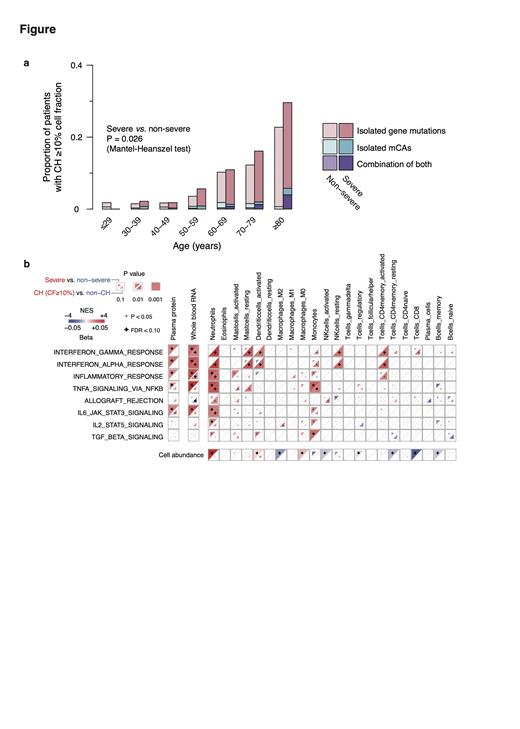Background
Clonal hematopoiesis (CH) is prevalent among aged populations and highlighted because its association with not only hematological malignancies but various benign diseases (e.g. cardiovascular diseases). Of particular interest among these diseases is COVID-19. To date, the association between severe COVID-19 and CH-related gene mutations or mosaic chromosomal alterations (mCAs) was examined using biobank samples taken long before the pandemic and the association has not been tested in a sufficiently large cohort of patients on the basis of CH evaluated at the time of COVID-19 diagnosis. Moreover, no study examined the joint effect of gene mutations and mCAs. The mechanism of the association between severe COVID-19 and CH has not been addressed either.
Methods
To address these issues we enrolled a total of 4,541 patients with COVID-19, of whom 54% had a severe infection. We performed targeted-capture sequencing of 42 CH-related genes and SNP-array analysis to detect CH-related mutations and mCAs. We also performed RNA-seq (n=987) of whole blood samples and plasma proteomic analysis (n=1,200) using the Olink technology to investigate the effect of biological consequence of CH, which was applied to understand the underlying mechanism of sever COVID-19.
Results
We identified gene mutations and mCAs in 16.3% and 6.2% of COVID-19 patients, respectively. They coexisted in 2.4% patients. As reported in CH in normal individuals, most frequent alterations included mutations in DNMT3A (7.6%), TET2 (4.1%), ASXL1 (1.4%), PPM1D (1.7%), and mCAs such as 14qUPD, and del(20q).
To evaluate the risk of severe COVID-19 conferred by CH, we compared the age-stratified frequencies of CH between severe and non-severe COVID-19 patients (Figure, a). Focusing on CH in ≧10% clonal fractions, CH was significantly enriched in severe COVID-19 in elderly patients, we detected a significant enrichment of cases with both gene mutations and mCAs and isolated gene mutations, but not that of isolated mCAs, in severe cases. Multivariable logistic regression analysis with adjustment for age and sex revealed the significant association of CH defined either CH-mutations or mCA with severe COVID-19 with an odds ratio (OR) of 1.34 [95%CI=1.03-1.84] in patients aged ≥65 years. Particularly, CH defined by combined gene mutations and mCAs conferred a remarkable increase in the risk of severe COVID-19 [OR=12.1, 95%CI=1.61-90.6], suggesting the presence of their synergistic impact on severe COVID-19.
To elucidate the underlying mechanism of the observed association between severe COVID-19 and CH, we next evaluated the transcriptomic/proteomic features of severe COVID-19 and CH (Figure, b). In severe COVID-19, multiple inflammatory pathways including IFN-α/γ, TNF-α, and IL-6 responses were consistently up-regulated in both transcriptomic and proteomic analysis. Similar to these features of severe COVID-19, CH was also associated with inflammatory response and IFN-α/γ responses in RNA expression while the impact of CH on protein expression was not prominent.
To further clarify the transcriptomic features of severe COVID-19 and CH, we performed deconvolution analysis of gene expression to estimate the fraction of each cell component and cell-type-specific expression profiles. Severe COVID-19 was characterized by elevated fractions of neutrophils, activated dendritic cells (DCs), and decreased fractions of several types of lymphocytes, while only a marginal increase of activated DCs was observed in CH. Cell-type-specific pathway analysis revealed up-regulations of inflammatory responses and IL-6/TNF-a signaling in neutrophils/monocytes were associated with both severe COVID-19 and CH independently, suggesting that CH might be involved in the development of severe COVID-19 through the augmentation of inflammatory responses in these myeloid cells, which are further augmented by increased neutrophils induced by COVID-19 independent of CH.
Conclusion
CH was significantly associated with an increased risk of severe COVID-19, particularly when the patients had both gene mutations and mCAs, where the augmented inflammatory responses by myeloid cells can be a mechanism of severe COVID-19 risk conferred by CH. Our findings highlight the link between the mechanism of severe COVID-19 and the biological effects of CH.
Disclosures
Nannya:Daiichi Sankyo Company Limited: Research Funding; Amelieff Corporation: Speakers Bureau; Otsuka Pharmaceutical Co., Ltd: Speakers Bureau.


This feature is available to Subscribers Only
Sign In or Create an Account Close Modal